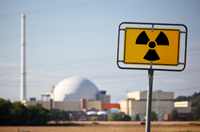I remember the first really large protest I ever attended. I was 21 and it was on the eve of the invasion of Iraq. The atmosphere was electric—all over the U.S. and around the world, people were out in the streets in massive numbers telling their leaders, “No War!” The eventual invasion and occupation of Iraq was a wake-up call to me about the decision-making abilities of our leaders. It moved me to action on other issues that I care about—especially the environment. My wife and I spent the next decade participating in various local campaigns around environmental issues. We developed valuable connections with local non-profits as well as other activists, attending rallies and other events.
It was at one such event with the Union of Concerned Scientists that the NW Friends of UCS was conceived, and I was able to broaden the scope of my environmental activism.
Building a local chapter
To hear my story about the creation of NW Friends of UCS, check out the Science Network webinar on Tips and Tricks for Communicating with Policy Makers, where I spoke more about how our local organization came to be.
I’ve discovered that one of the best things to do to build awareness for a cause is to identify individuals in your community that have an interest in your agenda. Whether it’s a professor or department head for a school’s environmental studies program (even science departments are often interested in environmental issues) or the head of a local chapter of an alumni, church, or business group, these individuals can facilitate outreach and community involvement within their own networks. Ironically, UCS also used this strategy to find concerned citizens in our community to get involved on a nuclear waste bill in the Senate in 2013.
Making political inroads
In early 2013, Sean Meyer from the UCS Global Security Campaign asked if we could contact the recently seated chair of the Senate Energy and Natural Resources Council, Sen. Ron Wyden (D-OR). The very first thing we did was literally pick up the phone and call the number for his Portland office. We requested a meeting to discuss Sen. Wyden’s position on reactor waste stored in spent fuel pools, and upcoming legislation his committee would draft on nuclear waste policy. We made sure to represent ourselves as concerned constituents first, and experts second (and not affiliated with UCS), as we believed this would give us a better angle to make our case.
After a few more emails and phone calls, we were on a conference call with Wyden’s DC staffer who was an AAAS Congressional Science & Engineering Fellow as well as the Deputy State Director. This was progress.

The most important thing for building relationships with policy makers and their staff is to follow up with a brief summary of the meeting and direct questions about what will be done to address your concerns. It’s also vital to maintain a professional approach to your interactions. For example, practical solutions to the safe intermediate storage of nuclear waste should not be a partisan issue.
Founder’s fatigue
If anyone ever tells you they’re “on” all the time, 99% of them are lying and the last 1% are certifiable. Being a volunteer activist is incredibly demanding work and having a day job and a family doesn’t make it any easier. There’s nothing wrong with taking a few months off activist-related actions (I certainly have). I think people often get charged up about an issue and jump into the fray, only to eventually burn out and pull back (often just when an issue needs another shot in the arm). You have to gauge your own “bandwidth” and come to terms with your personal capacity. These movements for change will do much better if you know your limits than if you burn bright and burn out.
Anything related to policy and local, state or national government will inevitably take years to sort out. The nuclear waste bill we talked with congressional staffers about is no different: it’s currently sitting in committee, delayed again until next year. But as concerned citizens, we’re in this for the long haul, and we’ll continue to speak up and stand up for practical, science-based solutions to policy problems.
To get involved on the nuclear waste issue, contact Sean Meyer, Manager of Strategic Campaigns for Global Security, at [email protected]. If you’re a scientist interested in becoming more involved in advocacy, or if you’re looking for action opportunities specific to your expertise or community, contact Melissa at the Science Network at [email protected].
